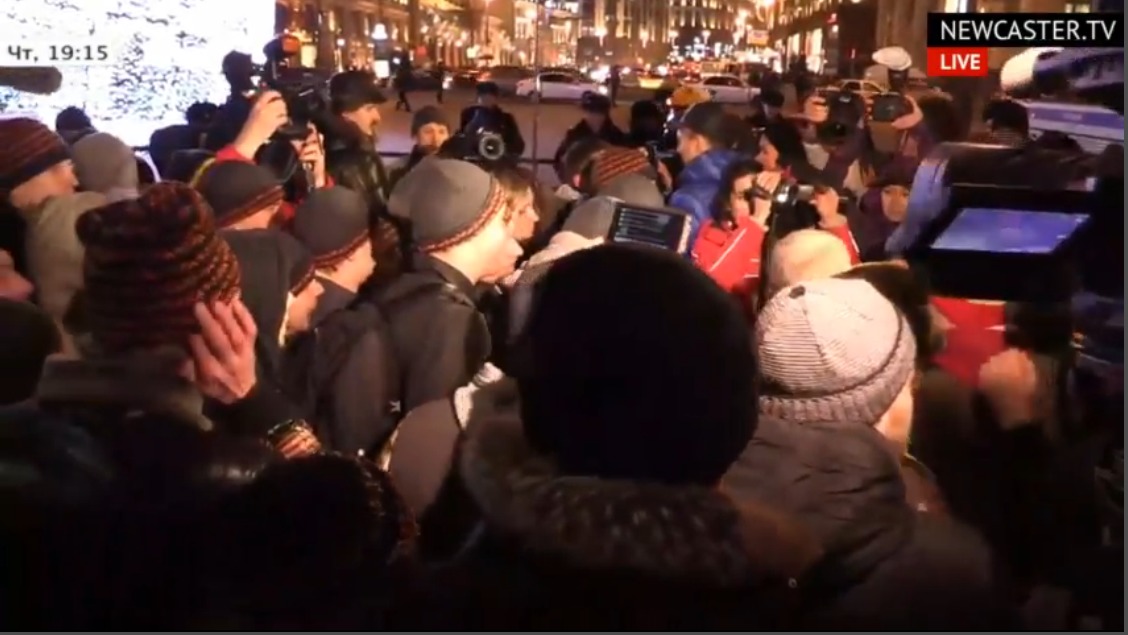Welcome to our column, Russia Update, where we will be closely following day-to-day developments in Russia, including the Russian government’s foreign and domestic policies.
The previous issue is here, and see also our Russia This Week story The Guild War – How Should Journalists Treat Russian State Propagandists? and special features ‘Managed Spring’: How Moscow Parted Easily with the ‘Novorossiya’ Leaders, Putin ‘The Imperialist’ A Runner-Up For Time’s ‘Person of the Year’ and It’s Not Just Oil and Sanctions Killing Russia’s Economy, It’s Putin.
Please help The Interpreter to continue providing this valuable information service by making a donation towards our costsâ€.
UPDATES BELOW
A shakeup in the Culture Ministry over protests and freedom of expression? RFE/RL reports:
Yevgeny Savostyanov, the head of Russia’s Coordination Council on Intellectual Property Protection, said in an open letter that he was “ashamed” of Culture Minister Vladimir Medinsky and no longer wished to work with his ministry.
In his letter, addressed to Medinsky, Savostyanov resigned from both the ministry’s board and its public council.
“The reason for this decision is the stance that you and the Culture Ministry have taken on a range of important matters of public interests, as well as some of your public statement and remarks for which I am ashamed,” he wrote.
The letter criticized Medinsky’s refusal to fund Russia’s prestigious festival of independent film, ArtdokFest, on the grounds that its president, Vitaly Mansky, made too many “antigovernment remarks.”
Savostyanov is a former FSB official and deputy chief of the Kremlin staff.
Earlier today Russia’s Ministry of Culture announced a ban on films that “threaten national unity.” See our earlier report on the Kremlin’s crackdown against movies which, one might say, dare to “question more.”
— James Miller
After police pushed most demonstrators off Manezhnaya Square this evening, and journalists went home, there were few left to pay attention to lingering groups of ultranationalists who had heckled opposition supporters earlier. Police left them alone, after briefly stopping a few.
But some of them waited around and then ganged up on the opposition supporters as they left the square, beating some of them, as blogger Yegor Maksimov reports.
Translation: a NOD [National Liberation Movement] rally on Manezhka and “Motherland, Freedom, Putin.”
NOD is an ultrarightist group founded by State Duma deputy Yevgeny Fyodorov which provides assistant and volunteers to the Russian-backed insurgency in the Donbass.
“Manezhka” is the nick-name for Manezhnaya Square in Moscow.
Translation: People were leaving and trying to chant, “Russia will be free!”. Several people in hoods with St. George ribbons began to beat one of them.
Translation: the police were not detaining the people in masks with St. George ribbons. They weren’t reacting at all to them.
Translation: Police beat me (though I had a press card) in the kidneys and shouted for everyone to go into the metro. They didn’t show their badges. They didn’t identify themselves.
Maksimov discussed past experience with police and extremist groups over the years at demonstrations.
Translation: Yes, it’s true, only the titushki here are what’s new.
The titushki were thugs used by Ukrainian riot police to harass and beat demonstrators. Russians have now borrowed the word to describe a similar phenomenon in Moscow where police appear to do nothing and let the far-right groups beat up the liberals.
— Catherine A. Fitzpatrick
The police monitoring group OVDinfo.org reports that at least 13 people were detained earlier this evening at a gathering in defense of opposition leader Alexey Navalny and his brother Oleg. Anti-opposition protesters who shouted “Maidan will not pass!” were not detained, say demonstrators.
Those detained say that several hundred people wearing St. George flag pins associated with ultranationalist groups who support Russia’s war against Ukraine began heckling and pushing them soon after their action began at 7 pm Moscow time.
In response to their cat-calls, the opposition supporters shouted back “If there is no freedom, there will be Maidan!” People from both sets of protesters were then detained by police.
All of those wearing the St. George ribbons were then immediately released by police, says OVDinfo.
Moscow policed lined up in rows and pushed demonstrators off Manezhnaya Square, forcing them down into the Revolution Square metro station or away from Manezhnaya Square.
Those arrested were put into police vans.
Eleven were taken to the Meshchansky Police Precinct.
Two were taken to the Kitai-Gorod Police Precinct.
Tonight, only ordinary cops were used to control demonstrators, and they didn’t swing any clubs — they mainly shouted into bullhorns.
No riot squads in helmets and camouflage were visible on the square, as only several hundred people seemed to be present, and most left when the police lines loomed over them.
Police blocked off entrance to the large, brightly lit Christmas ornament decorating the square for Russian Orthodox Christmas on January 7 and Old New Year’s Eve on January 12, under the old calendar.
Translation: They pushed them finally to the metro. It looks like that’s it. But not a single anti-Maidan activist was detained. #Manezhka
Translation: Don’t interfere with passage.
Translation: That’s it.
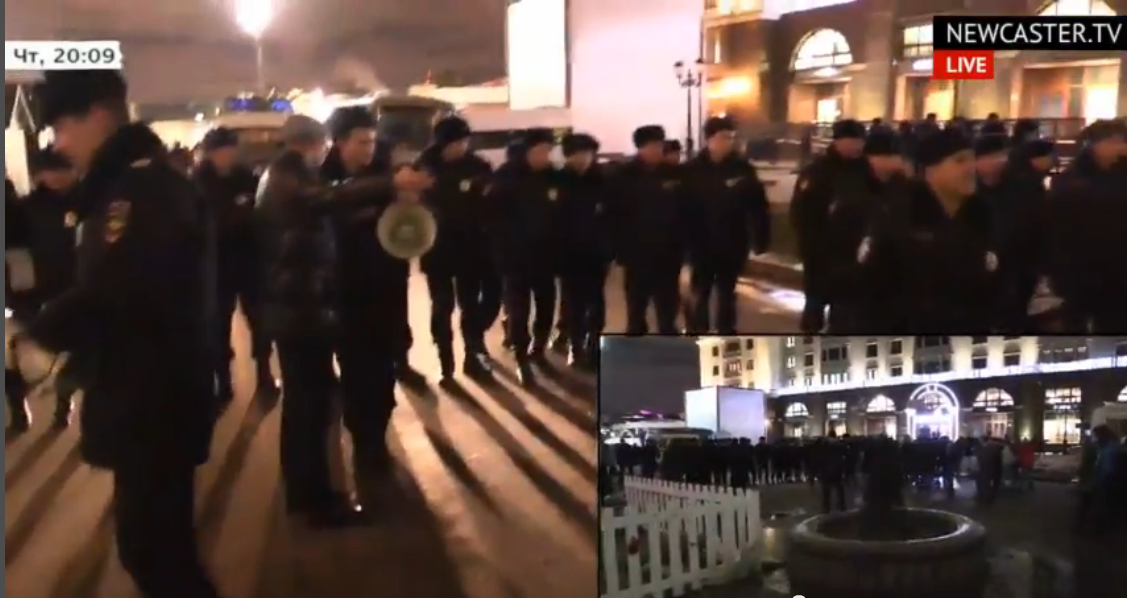
That was it for the pro-Navalny demonstrators, but the others seemed to hang around longer.
Translation: at Kamergersky St., there’s a bunch of Cossack fighters. Reserves, perhaps. There are a lot of them here, perhaps a hundred.
Cossacks showed up at the Navalny demonstration in December, shouting slogans in support of the “Donetsk People’s Republic” where they have joined other Russian-backed fighters. It’s not clear whether this group were part of the anti-opposition hecklers or whether authorities planned to use them in suppressing the demonstration in some way, as Cossacks are paid by the Russian government to assist in police functions.
— Catherine A. Fitzpatrick
Moscow police have formed lines and are methodically moving south and east across Manezhnaya Square now, pushing demonstrators toward the other side.
They’re calling out in bullhorns, “Respected Citizens! We urge you to go toward Revolution Square Metro Station. Do not delay. Your actions are unlawful.”
As in the past, they are forcing demonstrators off the square, down the stairs into the metro stations on the east side of the square, so that they go home.
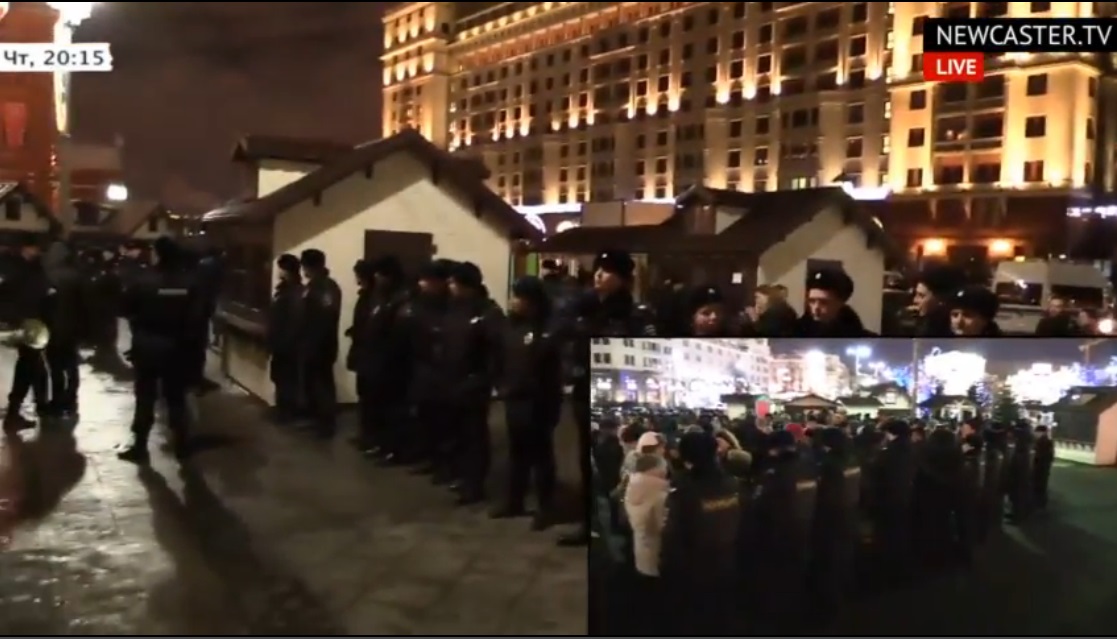
Some young men are still lingering by the police phalanx shouting, “Freedom for the Navalnys!,” the opposition leader and his brother who were sentenced last month.
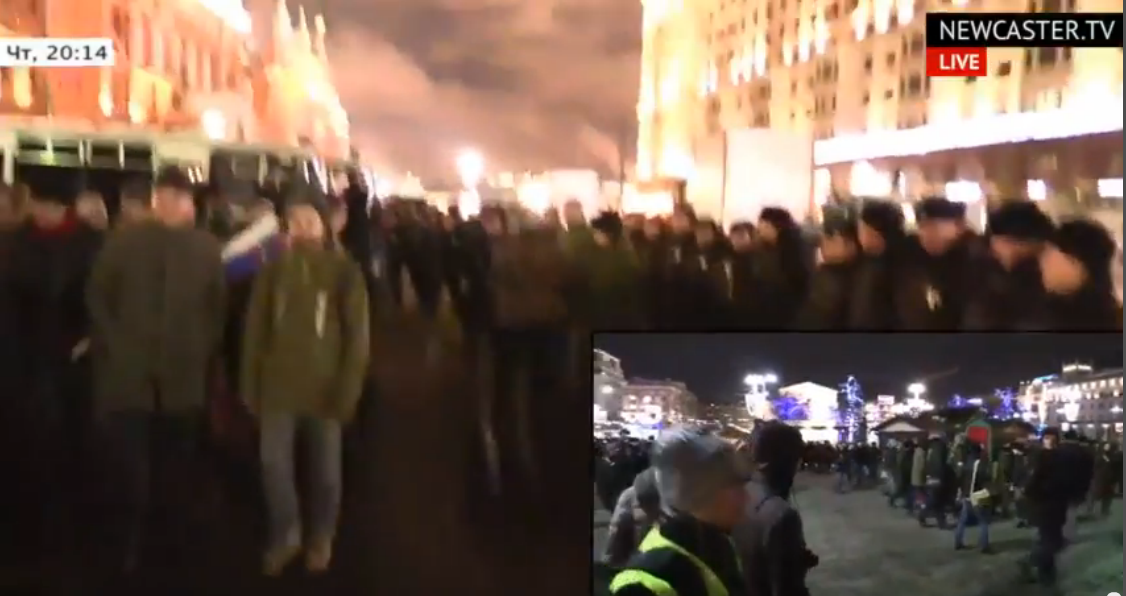
Police continue to tell demonstrators “Move toward the Metropolitan!” using the formal name for the Moscow metro.
The problem is that they are now themselves crowding the metro entrances.
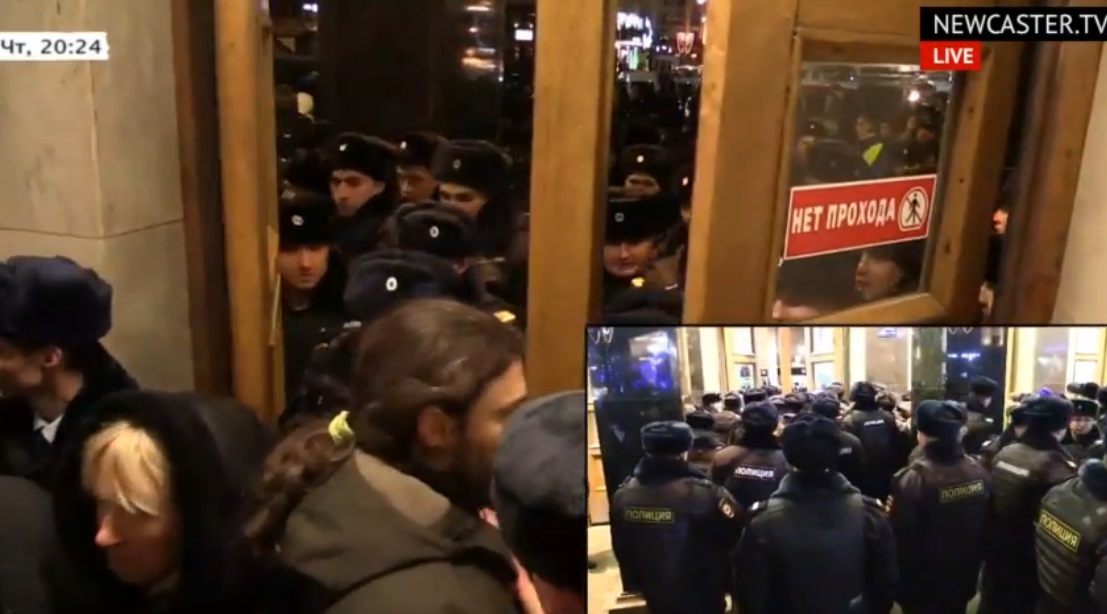
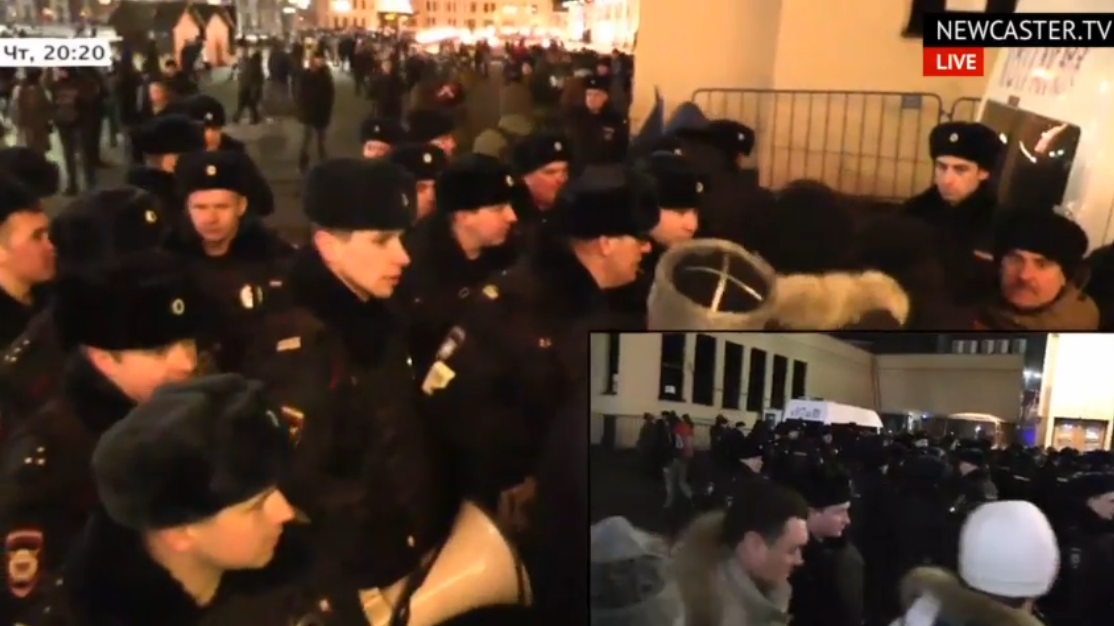
— Catherine A. Fitzpatrick
Photojournalist Philipp Kireev has published a brief Vine video of an elderly woman supporter of opposition leader Alexey Navalny, clutching a white ribbon — the symbol of anti-Putin rallies worn by tens of thousands back in 2011 and 2012 which have now dwindled to a few hearty souls.
“I feel as if I am alone here,” she says, looking around fearfully at the anti-opposition protesters who are shouting “Navalny on Trial!” and “Maidan Shall Not Pass!” – referring to the Ukrainian protest movement of last year that conservative Russians do not want to see repeated in their country.
“You’re not alone,” says Kireev, and a few others nearby — but most of
the few hundred people milling around on the square seem to be
anti-opposition activists, like the man in the red cape in the photo
below shouting for Navalny to be put on trial — which has already been done, multiple times.
Navalny is back under house arrest after a detention by police yesterday when he left his home to go to the radio Ekho Moskvy, a station increasingly under government pressure. He was handed a suspended sentence in December in a fraud case widely believed to be manufactured to put a chill on his anti-corruption blogging. He is now facing trial on charges of “art theft” stemming from possession of a street artist’s sketch — another trumped-up case.
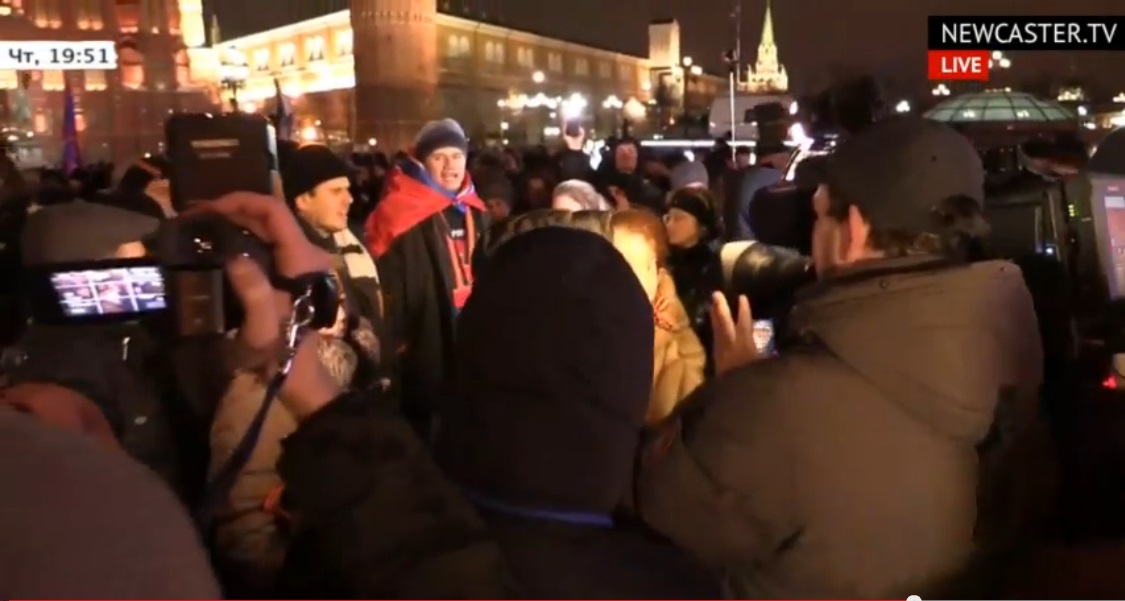
— Catherine A. Fitzpatrick
The livefeed narrator and a photojournalist are reporting that at least five people have been arrested already at the opposition demonstration tonight in Moscow.
At least a dozen leading supporters turned out in defense of anti-corruption blogger Alexey Navalny and his brother, sentenced in December to suspended and actual terms, respectively, of 3.5 years in prison on fabricated charges designed to chill anti-Putin protests.
Most of the other people on the square are anti-opposition demonstrators.
Details are not yet available on the detentions.
Translation: Evidently there are five people detained for now.
Anti-opposition protesters are waving the flags of the self-proclaimed “Donetsk People’s Republic” and the old Russian navy flag, which is used by the “Novorossiya” movement to reconstruct a pro-Russian territory out of parts of Ukraine, Belarus and Moldova.
Some people are singing Russian folk songs.

Russian border patrol police has arrested a Russian soldier, stationed in Armenia, after he reportedly killed 6 civilians. AP reports:
Armenian officials said the soldier, Valery Permyakov, who was serving at a Russian military base in Armenia, deserted from his unit and is suspected of killing the family at their home in the city of Gyumri early Monday. The only family member to survive the massacre was a 6-month-old baby, who suffered stab wounds.
However, protesters angry with the Russians have taken to the streets in Gyumri, and they have been met by an army of police:
Teargas and/or flash grenades have reportedly been fired, there appear to have been some arrests and clashes, but we would describe the current scene as tense but peaceful at the moment.
As you can see, however, the police confronted the crowd.
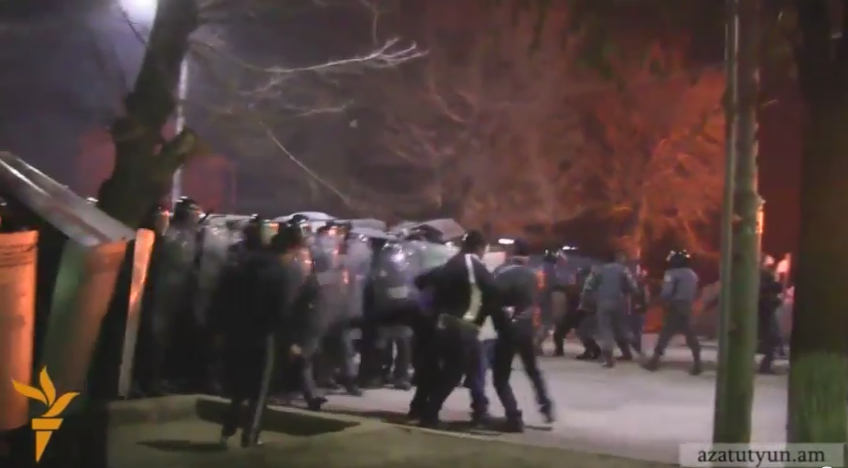
And some rocks were thrown.
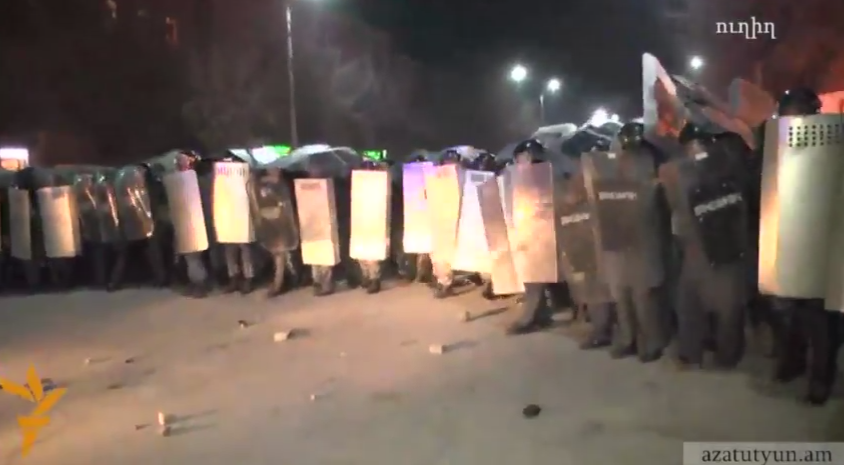
RFE/RL reports:
Hundreds of angry people clashed with riot police outside the Russian consulate in the Armenian city of Gyumri late on Thursday on the second day of protests against the killing of a local family allegedly committed by a Russian soldier.
The protesters gathered outside the diplomatic mission as they continued to demand that the suspect kept at the Russian military base in Gyumri be handed over to Armenian law-enforcement authorities.
Security forces in full riot gear fired tear gas and stun grenades and used truncheons to stop them from approaching the consulate compound.
The protesters responded with a hail of stones thrown at several rows of riot police. An Armenian opposition parliamentarian, Zaruhi Postanjian, begged them to back away and avoid further violence.
— James Miller
The narrator for the live feed from Manezhnaya Square in Moscow tonight says most of the people who have arrived on the square seem to be anti-Maidan protesters heckling the opposition, not supporters of opposition leader Alexey Navalny.
They’re shouting “Maidan ne proydyot” which is the Russian equivalent to “Maidan ne pasaran,” meaning the Ukrainian protest movement “will not pass” and take root in Russia as well.
Navalny himself called off the demonstration, so it’s not clear how many may show up.
Some Navalny supporters are shouting back at the hecklers, and saying they should be ashamed at themselves yelling at mainly middle-aged people and pensioners who turned up.
“You’ll be running a Maidan yourself soon, with the stores emptying,” counseled one middle-aged woman.
She reflects the notion common among Moscow intelligentsia that if anything like Kiev’s “Maidan” protest begins in Moscow, it will be for reasons of economic privation — and may be led not by liberals or Europe-leaning Westernizers, but Russian ultranationalists for whom Putin’s policies are not tough enough.
So far no physical clashes seem to be taking place, but police are shouting, “Respected Citizens! Please disperse. Your action is illegal” — as they always do at every protest of this type.
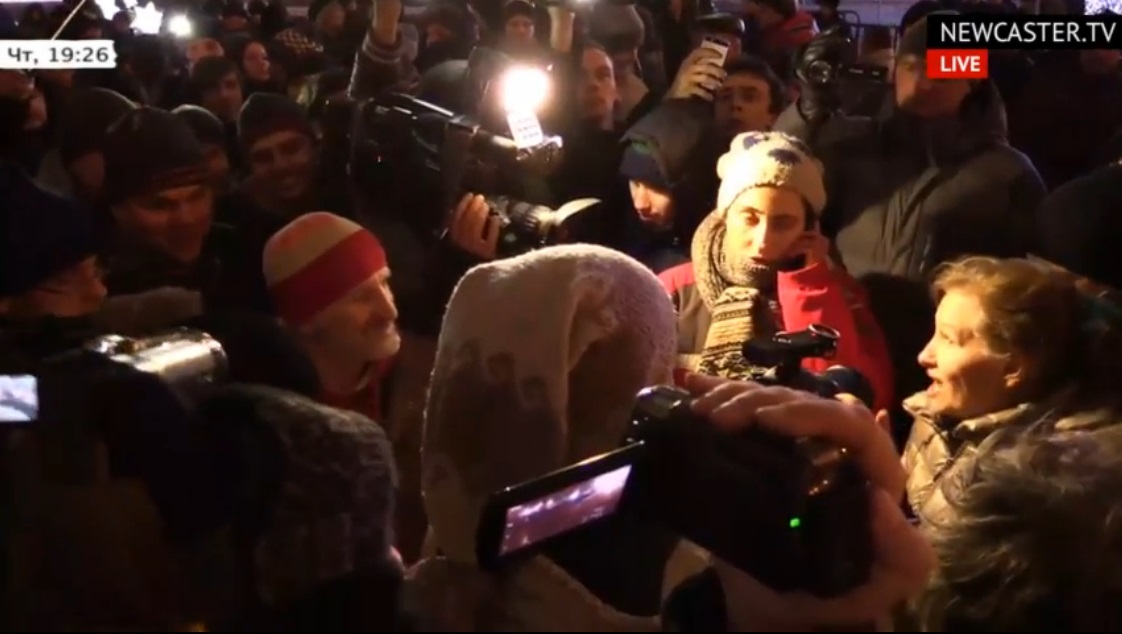
— Catherine A. Fitzpatrick
Supporters of Alexey Navalny and his brother Oleg, who came tonight to demonstrate at the Manezhnaya Square in Moscow, were greeted by numerous policemen and buses at the ready to arrest them.
They’re also facing hordes of angry counter-protesters shouting “Maidan Will Not Pass” and “If you don’t like Russia, go to the US!”
Police are shouting into bullhorns urging people to leave the area because their action is illegal.
Dmitry Aleshkovsky, known as “Mitya,” owner of the charity website nuzhnyapomosh.ru (“Help Needed”), has been fired from Ekho Moskvy, slon.ru reports.
Aleshkovsky ran a radio program at Ekho, owned largely by Gazprom-Media, which has increasingly come under government pressure to confirm to ideological standards set by President Vladimir Putin and Kremlin aides.
Aleshkovsky commented on his Twitter feed:
Translation: I am no longer host of the program “Feeling” at Ekho Moskvy. Lesya Ryabtseva has taken me off the air. NO JOKE.
Ryabtseva is the assistant of Alexey Venediktor, editor-in-chief of Ekho, who has increasingly been seen as an enforcer of the unpopular government polices.
Last year she took part in a working group to create social media guidelines for Gazprom-Media journalists which she also suggested would be good for all media to adopt. Ekho journalist Aleksandr Plyushchev was put on leave without access to broadcaster after he indulged in some black humor on his Twitter account about the death of the son of top Kremlin official Sergei Ivanov in a car accident.
The incident sparked a round of tense negotiations between Mikhail Lesin, then CEO of Gazprom-Media, and Venediktov, during which some feared Venediktov would be dismissed. But he prevailed, Plyushchev kept his job and then in another twist, Lesin was dismissed after a US probe into some properties he is alleged to own in California came to light.
Aleshkovsky was arrested in December for covering the demonstration in defense of Alexey Navalny, then released after a few hours of tweeting from a police van.
Venediktov had this to say on Twitter:
Translation: Well, friends, Mitya suggested I change the host of a broadcast. I always have the same answer – whether to Mitya or to Lesin. I decide who hosts on Ekho.
Aleshkovsky then indicated he was at the editorial offices:
Venediktov then commented:
Translation: the program “Feeling” about charity will remain on the Ekho Moskvy network with the same host. End of story.
That means Aleshkovsky may not be dismissed after all, but more information is awaited.
— Catherine A. Fitzpatrick
Memorial Human Rights Center, the leading human rights group in Russia, reports on their Facebook page that their offices in Gudermes, Chechnya have been raided.
Yesterday, January 14, about five unidentified man in black clothing and masks burst into the office when two employees were at their desks. The men threw eggs at them and shouted, “You defend Kalyapin!” as the reason for the attack.
Igor Kalyapin, the head of the Joint Monitoring Group of lawyers who have been taking up Chechen human rights cases, has himself been hit with eggs by supporters of Chechen strongman Ramzan Kadyrov at a Moscow press conference last month.
The human rights advocates have been active in recent months defending the families of terrorists killed in a shout-out with Chechen police in December in which 18 law-enforcers and 11 militants were killed. Kadyrov ordered the homes of all relatives of the gunmen, who were said to be from the Caucasus Emirate terrorist group, to be burnt to the ground. Dozens of relatives have experienced this reprisal and have fled the region.
The lawyers’ office in Grozny was set on fire last month after threats from Chechen police.
— Catherine A. Fitzpatrick
A large demonstration on Moscow’s Manezhnaya Square scheduled for today to protest the sentencing of opposition leader Alexey Navalny and his brother will proceed, organizers said on a Facebook page.
The live feed for the rally will be viewable here at 7:00 pm Moscow time in less than an hour.
Moscow police stand at the ready, with plenty of police buses to hold detained protesters.
On January 12, opposition leader Alexey Navalny urged that the rally be cancelled,
saying that events shouldn’t be timed to dates that the regime decides
are important — like a sentencing date it can then
arbitrarily change — but other dates, such as in the second half of
February.
A Facebook group devoted to gathering support for the action
attracted more than 33,000 answers of “yes” to the question of whether
followers planned to attend. About 5,700 said “maybe” — and that
figure, as we have come to see from past events of this nature, is
perhaps more realistic in judging the possible turn-out for events.
When officials suddenly changed Navalny’s sentencing date to
December 30, on a day’s notice, this Facebook group, started after
another one originated by opposition activist Leonid Volkov was blocked
by Facebook management at the request of the Russian government, had
more than 18,000 people saying they would come.
In the end, about 5,000 turned out on a very chilly night where
temperatures were -29 Celsius, and 250 were detained; most were released
the same night.
The group originally formed for the Manezhnaya demonstration called “15.01.15” has announced that it will be closing, and that followers can move to a new group to organize other actions called Manezh SOS.
But
the founder of the page, Marianna Karminova, says she is leaving it to
readers whether they should heed Navalny’s call to cancel the
demonstration or not. She noted that most people had work and family
commitments. While they were willing to risk arrest, they would rather
it be for a large and significant action:
Nevertheless, you are all independent people, some
believe that it is not necessary to orient toward individuals leaders
and do not believe that it is sufficient to express protest only now
and then. And also, Alexey’s call, “Go to rallies as if to work” is not
forgotten.
— Catherine A. Fitzpatrick
The Interpreter has a translation:
In particular, a film may not obtain approval for distribution if it “contains materials defaming national culture, creating a threat to national unity and undermining the foundations of the Constitutional Order, the Culture Ministry noted.
The Culture Ministry further clarified that the decree [on films] was supposed to go into effect starting January 1, 2015, but enforcement of it was postponed. “The decree will not go into force on January 1, 2015, as supposed, since responses from some of the ministries have not been received,” said the Culture Ministry.
But authorities don’t need a precise decree in order to crack down on any films or art events they do not like.
The recent Russian film Leviathan won a Golden Globe award and is showing in the West, but Russian officials are calling it “anti-Russian,” and delaying its release, says writer Masha Gessen, who reviewed it for the New York Review of Books:
Few Russians have seen Leviathan. Postponed at least twice,
it is now slated to open in Russia in February, but with an entirely new
soundtrack, cleaned up of all obscenities to comply with the country’s
newly puritanical laws (which ban use of obscene language in any media,
including products intended for adults only). While the film waits for
its theatrical release, the ruble has collapsed, robbing most Russians
of half of their assets, and anti-corruption blogger and the country’s
best-known opposition politician, Aleksei Navalny, has gone on trial; he
is facing up to ten years in prison. In his closing statement in a
Moscow court Navalny called the regime “a junta that has stolen
everything”—including, as Russian theater-goers know too well, any
private house, land, or business any bureaucrat has ever wanted to make
his own.
In a recent speech the country’s minister of culture made a reference
to the film without naming it, calling its genre “films about ‘Russia
the shithole.’” So why did Russia support its nomination? Vladimir
Menshov, the head of the Oscar nominating committee, opposed Leviathan’s
candidacy. “It’s a very strong work,” he has said, “but it is
difficult. We all base our impression of a country on its films. If
foreigners view this picture, they’ll get the impression that that’s the
kind of vileness we live in. The film is so hopeless!”
The official condemnation may have served to trigger even more interest in the film; it is one of the most pirated Russian films, so much so that distraught producers have set up a fund-raising site to encourage downloaders to pay.
Even if independent film houses try to display controversial movies, they may get a visit from the police.
In December, Moscow police broke up a showing of a movie on the Maidan movement in Ukraine at teatr.doc, an independent performance space recently evicted from its building.
Theater-goers were harassed by ultranationalist hecklers outside who
called them “traitors” for their interest in Ukraine. Some audience
members were arrested by police and released the same day.
Culturebot.org has an account, translated from Russian news accounts by Graham Schmidt:
The film begins with footage of Yanukovych’s legendary
press-conference, where he breaks a pen. Literally seconds later,
special agents [police] appeared, the lights were turned on, and they
announced that there was information suggesting a bomb had been planted,
and requested that we immediately evacuate the premises. While this was
happening, the special agents who’d been impersonating audience
members, and those who’d entered when the screening had been halted,
demanded that the proceedings not be photographed or filmed in any way.
It got to the point where cameras were being openly knocked out of
[audience members’] hands. In the basement’s exit, those who were being
“rescued” from an explosion were stopped by at least 5 special agents,
who’d organized a check of documents and a search of possessions. We
requested that they explain whether their operation was to save us, or
to detain us.Once on the street, we were met by a television crew from NTV, which
requested that all of us talk about what had happened, and most of us
addressed to them [the filmcrew] the very same question.
The apartment-building-courtyard’s exit was fully blocked by MVD
(Interior Ministry) personnel and the rescuees were told to enter an
armored vehicle [a paddy wagon]. Naturally, we asked, are we being
detained? Someone incomprehensibly explained that no, we were simply
being transported to the police station.
— Catherine A. Fitzpatrick
Translation: At 17, I thought I would read lectures about Malevich; at 20, about Foucault, and now I am grown up and read lectures about Russian prisons. #success.
Kazemir Malevich (1878-1935), the Suprematicist painter of the famous Black Square, would understand — he spent time as a political prisoner himself under Stalin in 1930.
Michel Foucault (1926-1984), the French philosopher, was never arrested, but wrote about how moved he was by the students of Tunisia who faced a mass police crackdown in 1968.
— Catherine A. Fitzpatrick
Mikhail Kriger, a supporter of opposition leader Aleksey Navalny, jailed for participation in a large demonstration on Manezhnaya Square on December 30, was released along with another demonstrator, Roman Nemuchinsky, yesterday, January 14.
Kriger, an activist who has also taken part in peace marches against Russia’s war on Ukraine, was inexplicably selected with a few others to serve longer jail sentences, although most among the 250 demonstrators detained that night were let go after a few hours.
Translation: on January 14, after 15 days of administrative arest, Mikhail Kriger and Roman Nemuchinsky got out. Here’s how it was.
Kriger was one of some 18,000 people who said in a Facebook support group that they would take part in the action in defense of the Navalnys — and did, along with about 5,000 others.
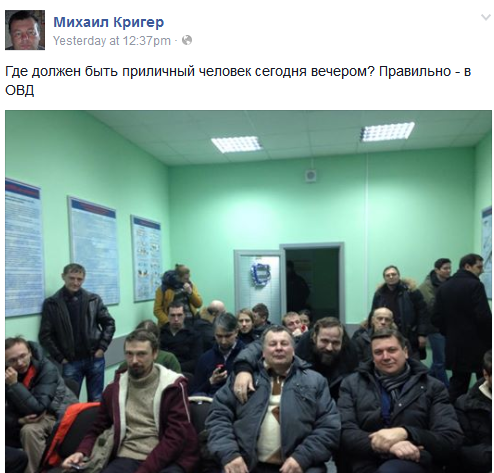
Mikhail Kriger, center, on December 30, 2014. Translation: Where should a decent person be this evening? Correct. At the police precinct.
— Catherine A. Fitzpatrick
This morning the ruble exchange rate is at 65.89 to US $1 and 76.92 to the euro. Brent crude oil is trading at $47.51 per barrel.This is a slight improvement from yesterday.
Nadezhda Tolokonnikova, the activist from the punk rock group Pussy Riot, noted today on Twitter that Russian authorities may have found one way to deal with the daily bad news of the ruble’s demise:
Translation: Currency exchange boards are being massively removed in Moscow. A clear resolution of the problem. An ostrich would approve.
A reader had a practical explanation:
Translation: They are changing to the new five-place signs instead of four?
Izvestiya reports that the removals are in compliance with a law passed last year that was supposedly motivated by esthetic concerns, for beautification of the city of Moscow. The Interpreter has a translation:
As Izvestiya determined, banks have begun to massively remove currency exchange boards from the fronts of their offices. Starting January 1, 2015, hundreds of such constructions must be removed. The problem is that under demands from the government of Moscow, banks must either reduce the size of their boards, or remove them — the new rules went into effect on May 1 of last year within the bounds of Sadovaya Ring Road, and this year, bank branches within the bounds of the Third Transport Ring Road also felt under the “purge.” In 2016, another 4,000 bank boards will be “repressed.”
The banks are removing the exchange boards from the fronts of their buildings in compliance with Moscow government Decree No. 902-PP, signed by Mayor Sobyanin on December 25, 2013. The law was drafted by the Committee for Architecture and Urban Planning of the City of Moscow (Moskomarkhitektura) with the involvement of the experts’ community, including specialists from the design studio of Artyom Lebedev.
So banks and presumably currency exchange booths as well must now follow a city ordinance to make signs on buildings built before 1952 a size of 50×50 centimeters (about 20×20 inches) (including the brackets). A board of 1×1 meter (about 3×3 feet)(including the brackets) is allowed on buildings built after 1952.
Why 1952? That’s a question to explore, given that architecture did not change dramatically that year — Stalin did not die until 1953. But perhaps it was because under Nikita Khrushchev, who was Moscow city boss in the early 1950s, there was something of a flourishing of the fine arts. What was more likely more relevant was a change in the type of construction panels for buildings to reduce costs, ordered by Khrushchev after an architecture conference in 1951. Moscow buildings did not come out of their Stalin phase immediately after that, but they began to change their look.
— Catherine A. Fitzpatrick
